8下Unit4语法知识点讲解与练习
人教版英语八年级下册单元知识点总结及同步练习 Unit3--4单元(无答案)
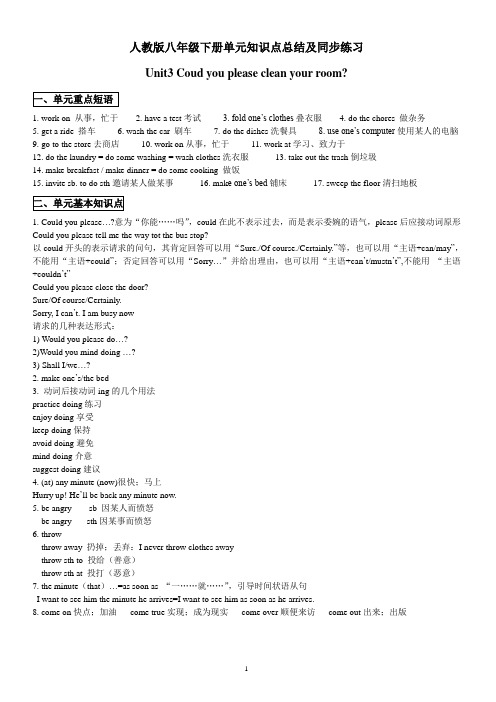
人教版八年级下册单元知识点总结及同步练习Unit3 Coud you please clean your room?1. work on 从事,忙于2. have a test考试3. fold one’s clothes叠衣服4. do the chores 做杂务5. get a ride 搭车6. wash the car 刷车7. do the dishes洗餐具8. use one’s computer使用某人的电脑9. go to the store去商店10. work on从事,忙于11. work at学习、致力于12. do the laundry = do some washing = wash clothes洗衣服13. take out the trash倒垃圾14. make breakfast / make dinner = do some cooking 做饭15. invite sb. to do sth邀请某人做某事16. mak e one’s bed铺床17. sweep the floor清扫地板1. Could you please…?意为“你能……吗”,could在此不表示过去,而是表示委婉的语气,please后应接动词原形Could you please tell me the way tot the bus stop?以could开头的表示请求的问句,其肯定回答可以用“Sure./Of course./Certainly.”等,也可以用“主语+can/may”,不能用“主语+could”;否定回答可以用“Sorry…”并给出理由,也可以用“主语+can’t/mustn’t”,不能用“主语+couldn’t”Could you please close the door?Sure/Of course/Certainly.Sorry, I can’t. I am busy now请求的几种表达形式:1) Would you please do…?2)Would you mind doing …?3) Shall I/we…?2. make one’s/the bed_________________3. 动词后接动词ing的几个用法practice doing练习enjoy doing享受keep doing保持avoid doing避免mind doing介意suggest doing建议4. (at) any minute (now)很快;马上Hurry up! He’ll be back any minute now.5. be angry ___ sb 因某人而愤怒be angry ___sth因某事而愤怒6. throwthrow away 扔掉;丢弃:I never throw clothes awaythrow sth to 投给(善意)throw sth at 投打(恶意)7. the minute(that)…=as soon as “一……就……”,引导时间状语从句I want to see him the minute he arrives=I want to see him as soon as he arrives.8. come on快点;加油come true实现;成为现实come over顺便来访come out出来;出版9. reply to sb/sth对某人/某物做出回答或反应10. all the time频繁;反复, 常常位于句末,强调在某段时间内一直进行或发生某事I have a dog and a cat, but they fight all the time.11. as…as…像……一样……表示两者在某方面程度相同,第一个as是副词,后应该跟形容词或副词的原级,第二个as是介词,后可跟名词,代词拓展:as…as…的否定形式是not as/so…as…“不如……;不与……一样”He studies as hard as his bother.He doesn’t study as/so hard as his brother12. neither1)neither did I 是“neither+be动词/助动词/情态动词+主语”结构,表示前者的否定情况也适用于后者。
新目标八年级下册英语Unit4任务型阅读与语法填空练习及答案

新目标八年级下册英语Unit4任务型阅读与语法填空练习一、任务型阅读I have a lot of problems recently. Firstly, I’m not happy in class. I’m so shy that I’m afraid of speaking in class. Secondly, I argued with my best friend. I’m very worried because I have few friends. I don’t want to lose her. Thirdly, I feel nervous when the midterm exams are coming. And sometimes I even can’t sleep well at night.Yesterday, my mother took me to the doctor. I told the doctor my problems and he gave me some suggestions. He asked me to make more friendly friends and play games in my free time, so that I will not be so shy. He also said, “If you don’t want to lose your best friend, you should talk with her. Tell her what you think. ”Because I can’t sleep well, he asked me to eat some food that is good for sleep. And he asked me to relax. I’m trying to follow his advice. I think I will get better soon.二、任务型阅读Not only adults but also teenagers have problems in their life. Here is a survey showing the main problems of teenagers.They feel stressed because they have too much homework to do both at school and at home. They have lots of exams to take. And parents usually send them to different classes at weekends. (4)They don’t have their own time to do what they are interested in.Now more and more teenagers are getting short-sighted. They often read in bed or keepreading for a long time without having a rest. Someof them are crazy about playing computer games.Some spend too much time watching TV.(5)Another serious problem among teenagers is thatmany of them are becoming fat. They eat too muchjunk food, but they take little exercise.I think teenagers should think of ways to dealwith the problems. They should make a plan forstudy and hobbies and find time to relax as much aspossible.任务一: 根据短文回答问题。
中考复习八年级下册人教版课前重点词汇语法听写Unit4

八年级下册人教版课前重点词汇语法听写本词汇表适合中考复习第一轮词汇过关使用本词汇表同样适用于在读八年级下册学员预习和复习词汇表按照八年级下人教版单词表格顺序原词➕拓展词汇相关的固定搭配,重要词汇的词性变化标注同义词对比对应词列举已表明按照顺序背单词可以检验词汇语法的基础原创词汇合法使用未经允许不可商用Unit 4英文中文allow sb to do sth 允许某人做某事something wrong with 某些部分有问题look through 快速查看浏览guess 猜deal with 处理handle with 处理make a deal 成交work out 成功的发展解决get on well with 相处融洽get alone well with 很好相处big deal 重要的事relate related relation 关联动词,关联的形容词关系名词relationship 关系communicate 沟通动词communication 沟通名词argue with 争论cloud cloudy 云多云的elder sister/brother 姐姐哥哥arguement 争论名词instead of 代替replace a for b 用a代替bwhatever 随便无论什么nervous nerve 紧张的神经(名词)offer sb sth offer sth to sb 提供某人某物proper=correct=right 正确的secondly 其次explain explanation 解释动词解释名词clear clearly 清晰清晰的copy a copy of 复制一份拷贝return =come back 回来return ticket 回程票round ticket 往返票anymore 再也不not anymore 不再member 会员compete competition 竞争动词名词in my opinion 在我看来skill skillful 技巧有技巧的social skill 社交技能type typical typically 类型,典型的,典型地play football 踢球cut out 删除删去continue to do 继续做某事to be continued 未完待去quick quickly fast 快compare a with b 把a比作bcompare a to b 把a和b比较be crazy about doing 疯狂做某事caused by 导致cause some trouble 导致很多麻烦usual unusual 寻常的非不寻常的usually unusually 通常不寻常地perhaps=maybe=probably 也许。
八年级下册人教版unit42d知识点
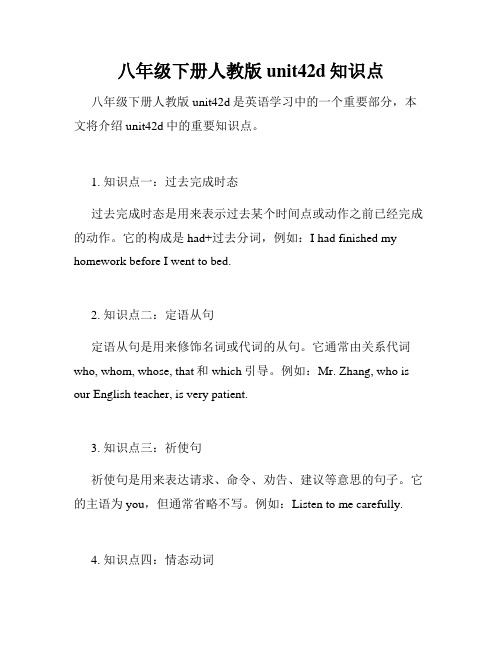
八年级下册人教版unit42d知识点八年级下册人教版unit42d是英语学习中的一个重要部分,本文将介绍unit42d中的重要知识点。
1. 知识点一:过去完成时态
过去完成时态是用来表示过去某个时间点或动作之前已经完成的动作。
它的构成是had+过去分词,例如:I had finished my homework before I went to bed.
2. 知识点二:定语从句
定语从句是用来修饰名词或代词的从句。
它通常由关系代词who, whom, whose, that和which引导。
例如:Mr. Zhang, who is our English teacher, is very patient.
3. 知识点三:祈使句
祈使句是用来表达请求、命令、劝告、建议等意思的句子。
它的主语为you,但通常省略不写。
例如:Listen to me carefully.
4. 知识点四:情态动词
情态动词表示说话者的态度、意愿、能力等,常用的情态动词
有can, could, may, might, must, shall, should, will和would。
例如:You must study hard if you want to pass the exam.
在学习unit42d的过程中,学生们需要认真掌握以上的知识点。
通过反复练习和积累,学生们可以更好地掌握这些知识点,提高
自己的英语水平。
初中英语人教新目标八年级下册 Unit 4基础知识练习题(附参考答案)

八年级英语下册Unit4基础知识练习班级考号姓名总分一、根据首字母或汉语提示写单词。
(每小题1.5分,共15分)1.-Where is Cathy? I can't find her all day.- I'm not sure.I g she may be ill.2.She won't give up her dream w happens.3.He likes playing soccer best.I , he played basketball this afternoon.4.You have too much p , so you should do something to relax.5.Driving too fast may c accidents.It's too dangerous.6.-I feel n before the exam.- Don't worry.Believe in yourself.ler is a (典型的)good teacher.He loves us very much.8.Tony and Sam are (成员) of the school basketball team.9.Could you tell me the (关系)between you and the writer?10.(百色中考)Please (归还)the books to the library on time when you finish reading.二、用括号内所给词的适当形式填空。
(每小题1.5分,共7.5分)1.Her little brother (usual)watches cartoons as soon as he arrives home.2.Our headteacher (allow) us to play sports after finishing our homework.3.The weather is (cloud) and cool today.Let's go to play tennis.4.We had a (quickly)breakfast because we got up late that day.5.What are the plans for the (develop) of your factory?1.Firstly, it's too expensive, and , it's too slow.2.-I think parents should have good with their children.-I agree with you.3.I don't mind you my books.4.My sister is afraid of in front of people.5.Can you hear what he is saying ?四、单项选择。
八年级unit4what's-the-best-movie-theater知识点讲解
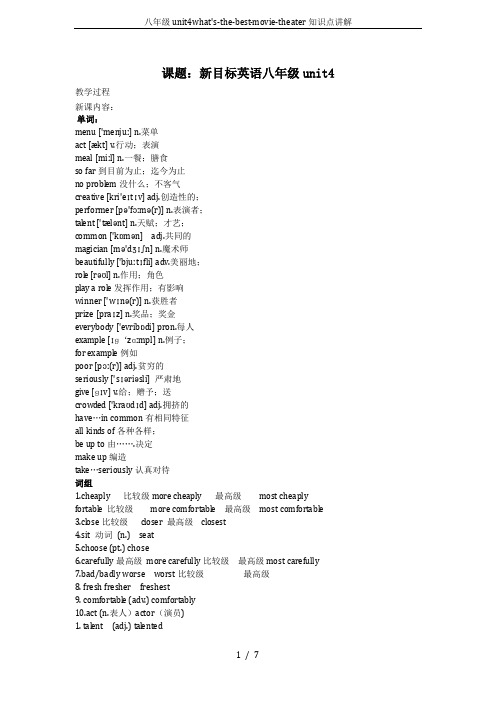
课题:新目标英语八年级unit4 教学过程新课内容:单词:menu ['menjuː] n.菜单act [ækt] v.行动;表演meal [miːl] n.一餐;膳食so far到目前为止;迄今为止no problem没什么;不客气creative [kri'eɪtɪv] adj.创造性的;performer [pə'fɔːmə(r)] n.表演者;tal ent ['tælənt] n.天赋;才艺;common ['kɒmən] adj.共同的magician [mə'dʒɪʃn] n.魔术师beautifully ['bjuːtɪfli] adv.美丽地;role [rəʊl] n.作用;角色play a role发挥作用;有影响winner ['wɪnə(r)] n.获胜者prize [praɪz] n.奖品;奖金everybody ['evribɒdi] pron.每人example [ɪɡ‘zɑːmpl] n.例子;for exampl e例如poor [pɔː(r)] adj.贫穷的seriously ['sɪəriəsli] 严肃地give [ɡɪv] v.给;赠予;送crowded ['kraʊdɪd] adj.拥挤的have…in common有相同特征all kinds of各种各样;be up to由…….决定make up编造take…seriously认真对待词组1.cheaply 比较级more cheaply 最高级most cheaply fortabl e 比较级more comfortable 最高级most comfortabl e3.close比较级closer 最高级closest4.sit 动词(n.) seat5.choose (pt.) chose6.carefully最高级more carefully比较级最高级most carefully7.bad/badly worse worst比较级最高级8. fresh fresher freshest9. comfortable (adv.) comfortably10.act (n.表人)actor(演员)1. talent (adj.) talented2.beautiful (adv.) beautifully 比较级more beautifully3. beautifully 最高级most beautifully4.win (n.表人)winner(获胜者)5.performer (v.) performw6.serious (adv.)seriously (最高级)most seriously7.give (pt.) gave8.crowd (adj.) crowded短语及句型:Section A1.the biggest screens最大的荧幕2. be the closest to home 离家最近3.the shortest waiting time 最短的等候时间4.have the most comfortabl e seats 有最舒服的座位5.the best sound 最好的声音6.buy clothes the most cheaply 买最便宜的衣服7. play the most boring songs播放最乏味的歌曲8.the worst music 最差的音乐9.the freshest food最新鲜的食物10.sit the most comfortably 坐得最舒服11.so far 到目前为止Section B12.the best performer 最好的演员13.the most talented person 最有天赋的人14.more and more popular 越来越受欢迎15.have...in common 有相同特征16.the funniest actors 最风趣的演员17.all kinds of 各种各样的18.play the piano the best 钢琴弹得最好19.sing the most beautifully 唱得最美妙20.be up to 是……的职责;由……决定21.play a role 发挥作用;有影响22.make up 编造(故事流言等)23.for exampl e例如24.take ...seriously认真对待重点句子:(1)It has the most comfortable seats. 它有最舒服的座位。
仁爱八年级unit4topic1知识点详解及练习

Unit4Our worldT opic1Which do you like better,plants or animals?一.重点短语:1.成千上万的thousand s of2.灭绝die out3.以.....为食feed on4.越来越少less and less5.处于危险状态be in d an ge r6.考虑,思考think of/about7.在农村in the countryside8.给某人提供某物provide sth for sb9.与......分享......share sth with sb 10.在.....扮演重要角色play an important part/role11.和......一起玩play...with 12.be important to sb对某人来说是重要的13.in the south of China在中国的南部14.在数量上越来越少become fewer and fewer in number15.欣赏自然之美enjoy the beauty of nature16.为了他们的毛皮和骨头杀了他们kill them for their fur and bones17.众所周知as we know18.储存水hold the water19.保持水循环k eep the water cycling 20.控制气候control the climate二.重点句子:1.I think the countryside is much quieter than the city.2.He is lazier than me.3.I think roses are the nicest of all the flowers.4.As we know,they are both i mportant to us.5.W e share the same world with them.6.Because animals are our friends.They make me happy.7.Which kind of animals do you like better,frogs or snakes?8.热带雨林的重要性的句子。
沪教牛津版初中英语八年级下册Unit 4知识点梳理

沪教牛津版初中英语八年级下册Unit 4知识点梳理Unit4课文Jason is learning how to make cartoons. He has found some information in a magazine.詹森正在学习怎样制作卡通片。
他已经在一本杂志中找到了一些信息。
How to make a cartoon?怎样制作一个卡通片?First, you need to decide on some basic ideas for a story.首先,你需要为一个故事确定一些基本信息。
This story is about a robot, Han. He always forgets things.这是一个关于机器人——韩的故事。
他总是忘记事情。
One day, Han meets his friends Sarah and Tim at the underground station.一天,韩在地铁站遇见了他的朋友莎拉和蒂姆。
He says, "I'm happy. I bought a new notebook. Now I won't forget things."他说:“我感到开心。
我买了一本新书。
现在我不会忘记事情了。
”Sarah says, "yes. I have one too. Here it is."莎拉说:“是的,我也有一本,在这呢。
”Tim asks, "Where's your, Han?"蒂姆问:“你的书在哪里,韩?”Han says, "Oh, no! I forgot to bring it!"韩说:“噢,不!我忘记带了!”In the second stage, think about the kinds of characters you want and what they will look like.在第二个阶段,思考下你想要的各种人物性格以及他们的样子。
牛津译林版八年级全册语法知识点总结

8A语法Unit 1 Friends形容词比较级和最高级的变化规则1.规则变化:(1)一般形容词+er +est (shorter, smaller, smallest )(2)以e 结尾的形容词+r +st (nicer, larger, largest)(3)以辅音字母加y 结尾的形容词变y 为i 再+er, est (busier, busiest; heavier, heaviest)(4)以重读闭音节结尾的形容词双写辅音字母+er, est 熟记:大(big)热(hot)天,一个穿红(red)衣浑身湿(wet)透的伤感(sad)胖(fat)子想要变得又瘦(thin)又苗条(slim)2.不规则变化(1)good(well)-better-best(2) many(much)-more-most(3)ill(bad, badly)-worse-worst(4) far-farther (further)-farthest (furthest)(5) little-less-least(6) few-fewer-fewest3.多音节的形容词比较级和最高级在词前加more , mostdelicious-more delicious-the most delicious popular-more popular-the most popular注意: 1 形容词的最高级前必须有the, 而副词的最高级前the 可省略2.比较级前常用a bit, a little, much, a lot, even, far 等词表示程度.3.形容词比较级用来比较两者(人或事)句中常有than; 形容词最高级用来比较三者或三者以上(人或事), 句中常有in 或of 短语表示比较范围.4. as+adj.+as (和------一样------) / not as/so +adj.+ as (不如------,不及------)Unit 2 School life一、比较事物的数量1.many (修饰可数名词)/much (修饰不可数名词)----more ----mostmore + 可数名词复数/ 不可数名词+ than ……比……数量多e.g. I have more friends than you.2.few (修饰可数名词) ----fewer----fewestlittle (修饰不可数名词)----less----leastfewer +可数名词复数+ than ……比……数量少e.g. There are fewer boys than girls in our class.less + 不可数名词+than ……比……数量少e.g. I spend less money on food than my sister.3.the fewest +可数名词复数在……中最少He has the fewest books.4.the least +不可数名词在……中最少She has the least money of us.5.the most + 可数名词复数/ 不可数名词最多Daniel has the most money.二、副词的比较级和最高级(构成方法及用法与形容词基本相同)1.一般在词尾直接加er或est,例如,hard-harder-hardest fast-faster-fastest loud-louder-loudest2、部分双音节词和多音节词分别在原级前加more构成比较级和most构成最高级,例如:slowly-more slowly-most slowly clearly-more clearly-most clearlycarefully-more carefully-most carefully3、副词比较级和最高级的不规则变化well-better-best badly-worse-worstfar-farther/further-farthest/furthestUnit 3 A day out一、as…as的用法表示A与B在某一方面程度相同或不同时用形容词/副词原级。
2020人教版英语八年级下册单元知识点总结和同步练习 Unit4(无答案)
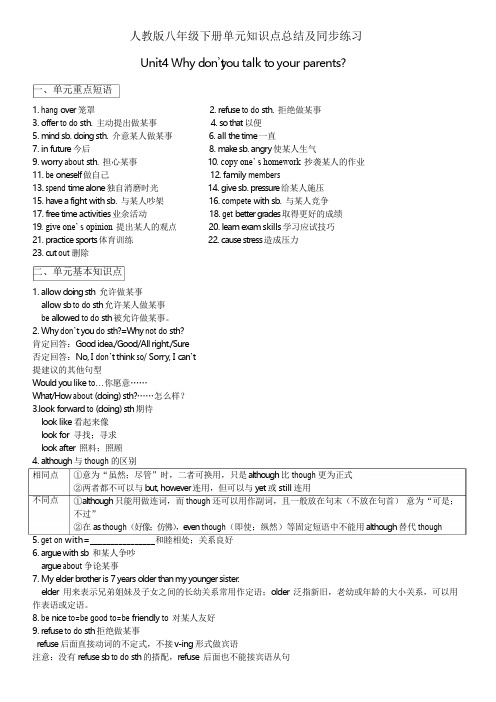
t 人教版八年级下册单元知识点总结及同步练习Unit4 Why don ’you talk to your parents?一、单元重点短语1. hang over 笼罩2. refuse to do sth. 拒绝做某事3. offer to do sth. 主动提出做某事4. so that 以便5. mind sb. doing sth. 介意某人做某事6. all the time 一直7. in future 今后8. mak e sb. angry 使某人生气 9. worry about sth. 担心某事10. copy one’ s homework 抄袭某人的作业 11. be oneself 做自己12. family members 13. spend time alone 独自消磨时光14. give sb. pressure 给某人施压 15. have a fight with sb. 与某人吵架16. compete with sb. 与某人竞争 17. free time activities 业余活动18. get better grades 取得更好的成绩 19. give one’ s opinion 提出某人的观点20. learn exam skills 学习应试技巧 21. practice sports 体育训练22. cause stress 造成压力23. cut out 删除二、单元基本知识点1. allow doing sth 允许做某事allow sb to do sth 允许某人做某事be allowed to do sth 被允许做某事。
2. Why don ’t you do sth?=Why not do sth?肯定回答:Good idea./Good/All right./Sure否定回答:No, I don ’t think so/ Sorry, I can ’t提建议的其他句型W ould you like to …你愿意……What/How about (doing) sth?……怎么样?3.look forward to (doing) sth 期待look like 看起来像look for 寻找;寻求look after 照料;照顾4. although 与 though 的区别相同点不同点 ①意为“虽然;尽管”时,二者可换用,只是 although 比 though 更为正式 ②两者都不可以与 but, however 连用,但可以与 yet 或 still 连用 ①although 只能用做连词,而 though 还可以用作副词,且一般放在句末(不放在句首) 意为“可是;不过”②在 as though (好像;仿佛),even though (即使;纵然)等固定短语中不能用 although 替代 though5. get on with=________________和睦相处;关系良好6. ar gue with sb 和某人争吵ar gue about 争论某事7. My elder brother is 7 years older than my younger sister .elder 用来表示兄弟姐妹及子女之间的长幼关系常用作定语;older 泛指新旧,老幼或年龄的大小关系,可以用 作表语或定语。
Unit-4-单元模块复习课件(含重点单词短语句型-语法-高频考点-对接中考)人教版英语八年级下册

38. give one’ s opinion 提出某人的观点
39. learn exam skills 学习应试技巧
40. practice sports
体育训练
41. cause stress
造成压力
42. cut out
删除
9
1单元基础读背
四、重点句型复习
1. I studied until midnight last night so I didn’t get enough sleep.
17
2单元语法回顾
三、状语从句
until\till 引导的时间状语从句 A 动词是延续性动词,主句为肯定 I‘ll wait for you till you come to see me. B 动词是非延续性动词 not…until I didn’t go to bed until I finished my homework.
2. allow sb. to do sth. 允许某人做某事
3. hang out with sb. 与某人闲逛
4. after-school classes课外活动课
5. get into a fight with sb. 与某人吵架/ 打架
6. until midnight
直到半夜
7. talk to sb.
4.—Do you like your new neighbors? —No. The____ between us are getting worse, I think. A. opinions B.relations C.spirits D.results
5.—Did you call him up last night? —No. I didn't. I wrote him a letter__ .
人教版英语八年级下册单元Unit 4 知识点+测试卷+思维导图

Unit 4 Why don’t you talk to your parents?1.重点词汇:communication, relation, allow, argue, cause, communicate, compare, compete, continue, copy, explain, guess, offer, push, return, wrong, quick, clear, crazy, nervous, proper, typical, usual, instead, perhaps, secondly....2. 短语归纳:1. look through 快速查看;浏览2. big deal 重要的事3. work out 成功地发展;解决4. get on with 和睦相处;关系良好5. cut out 删除;删去6. compare...with 比较,对比7. in one’s opinion 依……看3. 必背典句:1. Why don’t you forget about it? Although he is wrong, it’s not a big deal.你为什么不忘记呢?虽然他错了,但没什么大不了的。
2. He should talk to his friend so that he can say he’s sorry.他应该和他的朋友谈谈,这样他才能说对不起。
3. I studied until midnight last night so I didn’t get enough sleep.我昨晚一直学习到午夜,所以我没有得到足够的睡眠。
4.语法知识:1. 提建议的常用表达有:Why don’t you...?/Why not do...? (你)为什么不……呢?2. until引导时间状语从句连词until意为“直到……为止;到……时”,引导时间状语从句,常放在主句之后,也可以放在主句之前。
2014春八年级下册Unit4课文讲解+知识点+练习

二、重点句型1. I studied until mid night last night so I didn’t get enough sleep.我昨晚学习到半夜所以睡眠不足。
2. Why don't you forge t about it?你为什么不忘掉它呢?3. Although she’s wrong , it 's not a big deal.虽然她错了•但这并不是什么大事儿。
4. He should talk to his friend so that he can say he’s sorry.他应该跟朋友谈谈以便他能说声对不起。
5. Maybe you could go to his house.也许你可以去他家。
6. I guess I could, but I don’t want to surprise him.我想我可以.但我不想让他感到惊讶。
单元语法一、情态动词should与could的用法should的用法should为情态动词,表示劝告、建议,意为“应该”,它和其他情态动词一样,没有人称和数的变化,后接动词原形,其否定形式为shouldn’t。
Maybe she should say sorry to you.也许她应该跟你说声对不起。
could的用法情态动词could既是can的过去式,表示过去的能力,又可以表示谨慎、客气的建议,后接动词原形,其否定形式为couldn’t。
My grandfather could drive well even at the age of eighty.我的祖父甚至到了80岁任然能很好地驾车。
You could go out and buy her some medicine. 你可以出去给他买些药。
( ) The girl_____ read before she went to school.A. CouldB. Couldn’tC. ShouldD. May二、状语从句状语从句就是在句子中作状语的从句。
2020年春人教新目标英语八年级下册Unit4-5知识点总结

2020年春人教新目标英语八年级下册Unit 4 Why don’t you talk to your parents?1..用于提建议的句型有:What about doing sth ?=How about doing sth?(1). 同意对方的建议时,一般用:….怎么样?.Let’s do sth . 让我们一起做某事吧。
Shall we/I do sth? 我们做…好吗?had better do/not do sth 最好做/不做某事Will/Would you please do sth 请你做…好吗?Would you like to do sth? 你想去做某事吗?Would you mind doing sth?你介意做某事吗?Why don’t you do sth?= Why not do sth?为什么不呢?◆Good idea./ That’s good idea. 好主意◆OK/ All right./ Great 好/ 行/太好了◆Yes, please ./ I’d love t o 是的/ 我愿意◆I agree with you 我同意你的看法◆No problem 没问题◆Sure/ Of course/ Certainly 当然可以◆Yes, I think so 对,我也这样想(2).对对方的帮助或要求表示委婉谢绝时,一般用:◆I don’t think so 我认为不是这样◆Sorry, I can’t对不起,我不能◆I’d love to, but…◆I’m afraid…我愿意,但恐怕……2. allow doing sth 允许做某事allow sb. to do sth 允许某人做某事be allowed to do sth 被允许做某事allow与let的辨析:allow指“允许”,表示“默许,听任,不加阻止”,allow sb to do sth 允许某人做某事。
初中英语人教新目标八年级下册Unit4Grammar预习指导(知识点+练习题)
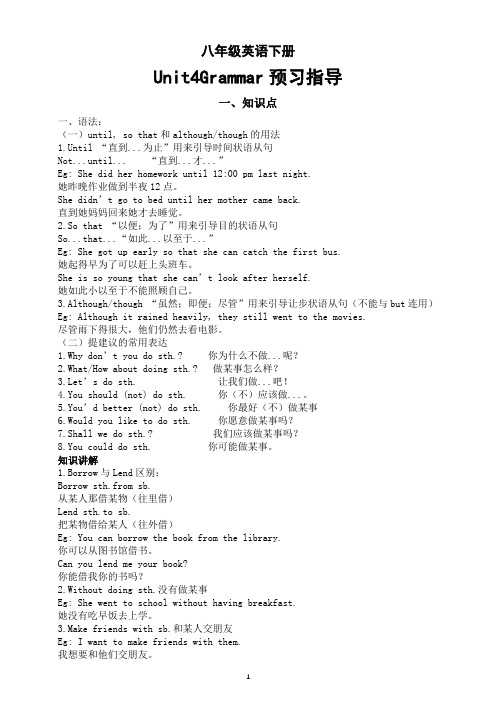
八年级英语下册Unit4Grammar预习指导一、知识点一、语法:(一)until, so that和although/though的用法1.Until “直到...为止”用来引导时间状语从句Not...until... “直到...才...”Eg: She did her homework until 12:00 pm last night.她昨晚作业做到半夜12点。
She didn’t go to bed until her mother came back.直到她妈妈回来她才去睡觉。
2.So that “以便;为了”用来引导目的状语从句So...that...“如此...以至于...”Eg: She got up early so that she can catch the first bus.她起得早为了可以赶上头班车。
She is so young that she can’t look after herself.她如此小以至于不能照顾自己。
3.Although/though “虽然;即便;尽管”用来引导让步状语从句(不能与but连用)Eg: Although it rained heavily, they still went to the movies.尽管雨下得很大,他们仍然去看电影。
(二)提建议的常用表达1.Why don’t you do sth.? 你为什么不做...呢?2.What/How about doing sth.? 做某事怎么样?3.Let’s do sth. 让我们做...吧!4.You should (not) do sth. 你(不)应该做...。
5.You’d better (not) do sth. 你最好(不)做某事6.Would you like to do sth. 你愿意做某事吗?7.Shall we do sth.? 我们应该做某事吗?8.You could do sth. 你可能做某事。
人教八年级下Unit4知识点总结
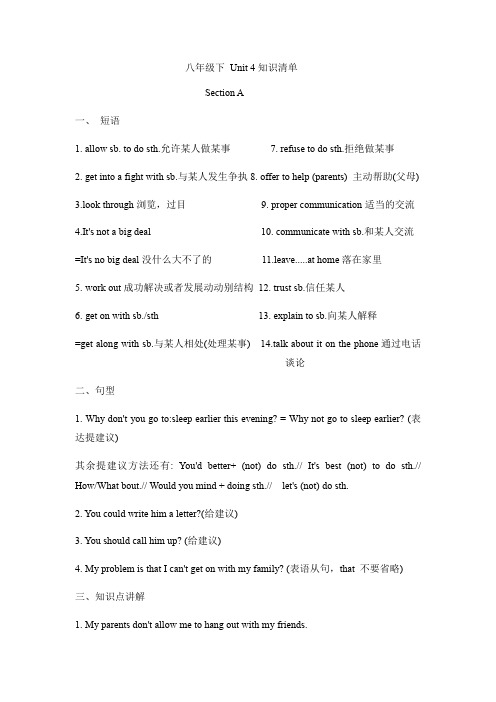
八年级下Unit 4知识清单Section A一、短语1. allow sb. to do sth.允许某人做某事7. refuse to do sth.拒绝做某事2. get into a fight with sb.与某人发生争执8. offer to help (parents) 主动帮助(父母)3.look through浏览,过目9. proper communication适当的交流4.It's not a big deal 10. communicate with sb.和某人交流=It's no big deal没什么大不了的11.leave.....at home落在家里5.work out成功解决或者发展动动别结构12. trust sb.信任某人6.get on with sb./sth 13. explain to sb.向某人解释=get along with sb.与某人相处(处理某事) 14.talk about it on the phone通过电话谈论二、句型1. Why don't you go to:sleep earlier this evening? = Why not go to sleep earlier? (表达提建议)其余提建议方法还有: You'd better+ (not) do sth.// It's best (not) to do sth.// How/What bout.// Would you mind + doing sth.// let's (not) do sth.2. You could write him a letter?(给建议)3. You should call him up? (给建议)4. My problem is that I can't get on with my family? (表语从句,that 不要省略)三、知识点讲解1. My parents don't allow me to hang out with my friends.①allow sb. to do sth.允许某人做某事They don' t allow you to take pictures in this museum.①be (not) allowed to do sth. (不) 被允许做某事Smoking is not allowed here.I am not allowed to stay out past ten.①Allow me to do sth.表示礼貌的建议(please) allow me to introduce myself.2.It is not a big deal.没关系,不要紧。
2020年春人教新目标英语八年级下册Unit4单元重难点知识点总结讲练(无答案)
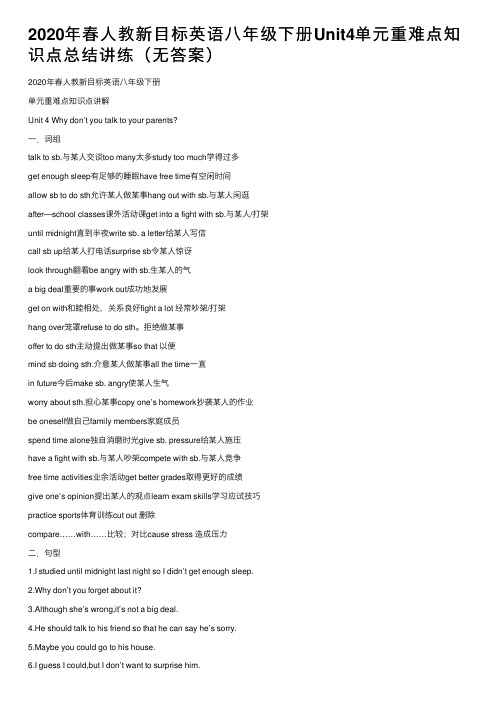
2020年春⼈教新⽬标英语⼋年级下册Unit4单元重难点知识点总结讲练(⽆答案)2020年春⼈教新⽬标英语⼋年级下册单元重难点知识点讲解Unit 4 Why don’t you talk to your parents?⼀.词组talk to sb.与某⼈交谈too many太多study too much学得过多get enough sleep有⾜够的睡眠have free time有空闲时间allow sb to do sth允许某⼈做某事hang out with sb.与某⼈闲逛after—school classes课外活动课get into a fight with sb.与某⼈/打架until midnight直到半夜write sb. a letter给某⼈写信call sb up给某⼈打电话surprise sb令某⼈惊讶look through翻看be angry with sb.⽣某⼈的⽓a big deal重要的事work out成功地发展get on with和睦相处,关系良好fight a lot 经常吵架/打架hang over笼罩refuse to do sth。
拒绝做某事offer to do sth主动提出做某事so that 以便mind sb doing sth.介意某⼈做某事all the time⼀直in future今后make sb. angry使某⼈⽣⽓worry about sth.担⼼某事copy one’s homework抄袭某⼈的作业be oneself做⾃⼰family members家庭成员spend time alone独⾃消磨时光give sb. pressure给某⼈施压have a fight with sb.与某⼈吵架compete with sb.与某⼈竞争free time activities业余活动get better grades取得更好的成绩give one’s opinion提出某⼈的观点learn exam skills学习应试技巧practice sports体育训练cut out 删除compare……with……⽐较;对⽐cause stress 造成压⼒⼆.句型1.I studied until midnight last night so I didn’t get enough sleep.2.Why don’t you forget about it?3.Although she’s wrong,it’s not a big deal.4.He should talk to his friend so that he can say he’s sorry.5.Maybe you could go to his house.6.I guess I could,but I don’t want to surprise him.三.⽇常交际⽤语1.——What’s wrong? ——I’m really tired because I studied until midnight last night. ——Why don’t you go to sleep earlier this evening?2.——What’s the matter,Peter?——I had a fight with my best friend.3.——What should I do?——Well,you should call him so that you can say you’re sorry.4.——Thanks for your advice. ——No problem.Section A1.辨析too much与too manytoo much“太多”+不可数名词too many“太多”+可数名词复数He drank too much beer yesterday. She talked too much.Too many children are playing on the playground.【提⽰】much too“太……,⾮常……”+adj./adv——Why are you so tired these day?【练习】——Well,I have ______work to do.A.too muchB.too manyC.much tooD.many too2.allow 允许,许可allow常见⽤法如下:(1)allow sb to do sth. “允许某⼈做某事”My parents allow me to go out at night.(2)allow doing sth.“允许做某事”+v_ingThe library doesn’t allow taking loudly. She doesn’t allow smoking in her house.(3)allow+名词We can’t allow such a thing.【练习】The young should be allowed __________(achieve)their dreams on their own.Do you often allow _______until 11:00 p.m.?A.to stay upB.stay upC.staying upD.and stay up3.work out产⽣……效果,进展……Things worked out quite well for us.【拓展】work out “计算出,设法弄明⽩”He worked out the answer by computing again,but more carefully.You’d better work out a plan to improve your writing skills.Can you work out the problem alone?【练习】保持句意基本不变Jessica solved the physics problems without any help.Jessica________ _________the physics problems without any help.4.get on with……Mrs Smith gets on well with her neighbors.go on with+sb. “与……相处” +sth “进展”=get doing with……表⽰相处的如何,在with前加well(好)或badly(差)等修饰词。
人教版初中英语八年级下册语法知识点
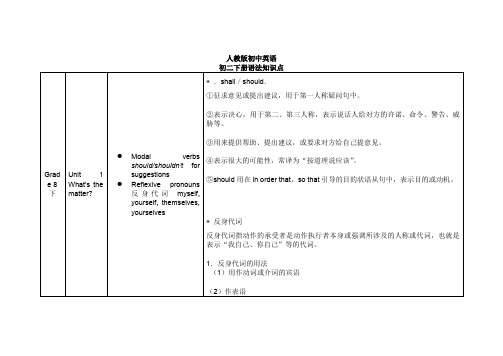
4.动词+副词+介词(其后需加宾语)
5.动词+名词(其后不加宾语)
make a bed整理床铺take place发生make faces做鬼脸
6.动词+名词+介词(其后需加宾语)
It is very kind of you to help me.=You are very kind to help me.你帮我的忙,太谢谢你了。
5.疑问词和不定式连用和疑问词连用的不定式在句中相当于名词,常作主语、宾语、表语、同位语等。
6.省略to的不定式
(1)当两个(或两个以上的)不定式由and,or,than等连接时,通常只需在第一个不定式前用to,其余不定式前的to可省略。
4)当某些结构后的不定式动作与句中某一动作重复时,不定式符号to之后的其他成分可以省略,只保留不定式符号to。常见结构有:be able to,be going to,have to,ought to,used to等。
8.不定式的主动表示被动
①在“be+性质形容词+不定式”结构中。
此类形容词有easy,hard,difficult,interesting,heavy,pleasant,comfortable,safe,dangerous,impossible等。
4.不定式的复合结构不定式用for和of引出逻辑主语,带有逻辑主语的不定式称为不定式的复合结构。不定式的复合结构在句中可作主语、宾语、定语等。
当作表语的形容词表示人的性格、品质时,常用of引出不定式的逻辑主语,否则用for引出。常见的表示性格、品质的形容词有:
good好的kind和蔼的brave勇敢的honest诚实的lazy懒惰的nice好的wise明智的clever聪明的silly傻的stupid笨的foolish愚蠢的right正确的wrong错的rude粗鲁的polite礼貌的fair公正的unfair不公正的careless粗心的careful细心的patient耐心的
- 1、下载文档前请自行甄别文档内容的完整性,平台不提供额外的编辑、内容补充、找答案等附加服务。
- 2、"仅部分预览"的文档,不可在线预览部分如存在完整性等问题,可反馈申请退款(可完整预览的文档不适用该条件!)。
- 3、如文档侵犯您的权益,请联系客服反馈,我们会尽快为您处理(人工客服工作时间:9:00-18:30)。
最新牛津译林版8下Unit 4语言点知识点讲解与练习本单元语法知识一、“特殊疑问词+动词不定式”的用法归纳(一)由两部分构成:疑问词和动词不定式(wh-+to do)。
疑问词部分包括疑问代词who, whom, what, which和whose以及疑问副词when, where和how。
此外,连接词“whether”也适用.它主要具有以下几种功能:⑴当主语,如:● When to hold the meeting has not yet been decided.● Where to live is a problem.⑵当宾语,常接在forget, find out, discuss, decide, tell, teach, know, learn, wonder, remember等动词之后作宾语如:● We must know what to say at a meeting.● He could not tell whom to trust.● Do you know how to play bridge?⑶当表语,如:● The problem i s where to find the financial aid.● The question is who to elect.⑷当名词同位语,如:● Tom had no idea which book to read first.● The question whether to confess troubled the girl.⑸用于宾语补足语,双重宾语。
某些动词后可接“sb.+ 疑问词+ 不定式”构成的双重宾语,这类动词常用的有advise, ask, show, teach, tell等如:● I can tell you where to get this book.● I ask her how to learn English.● He will advise you what to do.● Will you show me how to use the machine?(6) 作介词宾语:某些介词后面可接"疑问词+不定式"作宾语,这类介词常用的有about, as, from, in, of, on, with等。
例如:He has no idea of how to answer this question. 他不知道怎样回答这个问题。
Della had only $1.87 with which to buy Jim a present. 德拉仅有$1.87为来吉姆买一件礼物。
(which是关系代词)You have a number of topics from which to choose. 你有很多题目可以选择。
(which是关系代词)(二)“特殊疑问词+动词不定式”这种结构可以把复合句转为简单句。
如:I don’t know what I’ll do next. = I don’t know what to do next.The doctor told him when he should take the medicine. = The doctor told him when to take the medicine.同样,因为“特殊疑问词+动词不定式”这种结构相当于一个名词性从句,所以可用同等成分的从句代替,从而把简单句转换为复合句。
改写时只需在疑问词后加上适当的主语,并把不定式改为适当的形式的谓语即可。
如:Which to choose is important. = Which we should choose is important.The question is where to go. = The question is where we should go.(三)“特殊疑问词+动词不定式”这种结构可构成独立问句。
如:What to do? 怎么办?How to get rid of the trouble? 如何摆脱困境?按照英语语法的习惯,疑问副词why 后不直接跟动词不定式,如:误:I don’t know why to choose that dictionary.正:I don’t know why you must choose that dictionary.但它可以接不带to的动词不定式,即动词原形,构成why do sth./ why not do sth. 肯定形式是表示某动作是不必要的或没有意义的,而否定形式是表示向某人提建议和表达看法,相当于祈使句。
Today is Sunday. Why not go out to relax yourself?Why pay more at other shops? We have the best value.练习一:( )1.I have no idea when _________ her the bad news.A. will tellB. tellingC. tellD. to tell( )2. ---Will you please show me how to do the role-play exercise?---Sure. Now let me tell you ________ first.A. which to doB. how to doC. when to doD. what to do( )3. I need your help because I don’t know ________.A. how to do itB. how to doC. what to do itD. what should I do( )4.---How are you feeling here?---It’s quite hot. I don’t know ________ to go or stay.A. howB. whenC. whetherD. where( )5.---I don’t know ________ to do with this maths problem. It’s too hard.--- You can ask your classmates or teachers for help.A. whichB. howC. whatD. when( )6. ---Millie, could you give me some advice? I don’t know ________.--- Why don’t you wear this red shirt?A. when to wearB. what to wearC. how to wearD. where to wear( )7. I’m going on a field trip but I haven’t decided________.A. what to doB. to do whatC. where to goD. to go where( )8 ---This physics problem is too difficult. Can you show me ________,Wang Lin?---Sure.A. what to work it outB. what to work out itC. how to work it outD. how to work out it ( )9. Excuse me. Would you please tell me ________ buy a digital camera?A. what toB. where toC. what I canD. where can I( )10. There isn't any difference between the two. I really don't know ________.A. where to chooseB. which to chooseC. to choose whatD. to choose which二、动词不定式做宾语补足语(1)常接带to的动词不定式作宾语补足语的动词有:ask, tell, want, teach, wish等;(2)接不带to的动词不定式作宾语补足语的动词有:see, watch, hear, make, let advise, allow, ask, beg, command, tell, invite, force, oblige, get, help, encourage, persuade, permit, remind, request, order, warn, cause等。
例如:I often see him play football.She often asks me to help her.We don't allow such things to happen again.Most of the parents agree to forbid their children to smoke.She asked me to answer the phone in her absence.Please remind me to leave her this note.She requested him to go with her.(3)用不定式作宾语补足语的几种说明:①help后面作宾语补足语的动词不定式可以带to也可以不带to。
如:I often help my mother (to) do some housework.②在使役动词后作宾语补足语,不定式不带to。
有些动词跟不定式作宾语补足语时省去了to,这些动词有:一感二听三让四观看。
一感:feel二听:hear, listen to三让:let, have, make 四观看:notice, see, watch, look at这类动词有:make, let, have等。
转为被动语态时,其后通常都用带to的不定式(have没有被动语态)。
例如:What would you have me do?Let him do whatever he wishes to do.Though he had often made his little sister cry, today he was made to cry by his little sister.(4)不定式作宾语补足语的有以下八种类型:①许多动词可跟一个宾语+ to do…构成句子,句中的不定式作宾语补足语;否定形式为“动词+宾语+not to do…”。
